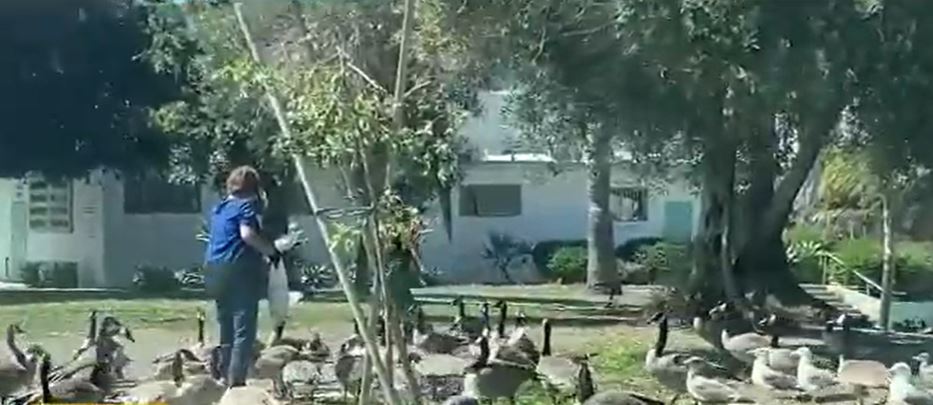Geese overrun park in Lawndale; experts blame overpopulation on food provided by the public

By Ashley Mackey
Click here for updates on this story
LAWNDALE, California (KABC) — It’s been a honking good time for the booming population of geese that has overrun Alondra Park in Lawndale these days, but not so much for their human neighbors.
Residents who live across the street from the park told ABC7 they’ve seen the geese population grow drastically over the last few years.
They say the once beautiful lake now has an odor, is littered with droppings and is buzzing with flies.
“They will go where there is food available,” Megan Bauer, senior wildlife technician at the Wetlands and Wildlife Center, said. “Because people keep offering them food, more and more will keep congregating, and that is leading to that overpopulation.”
Despite signs posted around Alondra Park to not feed the wildlife, just in the short time that ABC7 visited the park, people fed the birds cereal, popcorn, bread and potatoes.
Experts say feeding the fowl certain foods can be harmful.
“That can cause issues such as what we call ‘angel wing’. That makes them unable to fly. It’s very painful,” Bauer said. “Unfortunately, that is not a very good end for geese who are supposed to be able to fly away from predators.”
Some neighbors say the geese wander into the street, stop traffic and sometimes get hit.
On the other hand, some park visitors say they enjoy seeing the wildlife.
“When I first started running, I used to be a little bit aggravated at avoiding all the droppings,” Ron Berman, a runner at Alondra Park, said. “But, you know, after a while, it’s like ‘I don’t care’. Its great seeing nature.”
The park is serviced by Los Angeles County, and they say their main goal is to educate the public on how to safely cohabitate with the geese, which includes not feeding them.
“Canada geese are a native species to North America, and they are federally protected by the Migratory Bird Treaty Act of 1918,” Los Angeles County Parks and Recreation Department biologist Cristhian Mace said. “Harassing or trying to relocate them is really not an option. We need to learn to share this space with them peacefully.”
Please note: This content carries a strict local market embargo. If you share the same market as the contributor of this article, you may not use it on any platform.